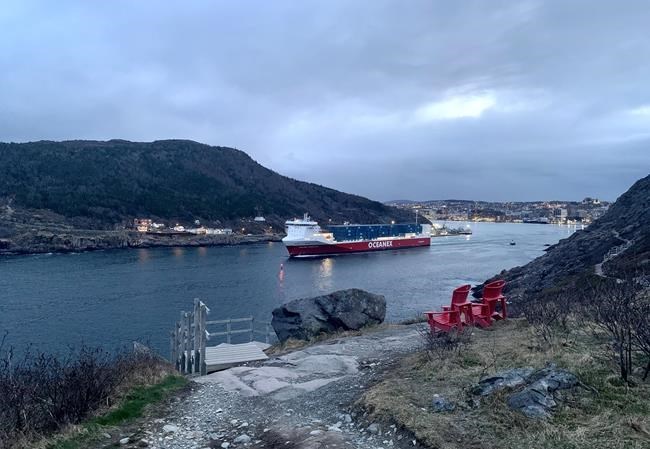ST. JOHN'S, N.L. — Health officials confirmed Wednesday three more COVID-19 cases aboard a Portuguese fishing vessel anchored off the coast of Newfoundland and Labrador.
The ship, called the Princesa Santa Joana, is one of two vessels now sitting off Newfoundland's Avalon Peninsula with COVID-19 infections confirmed among their crew. "It's definitely a concern," said Karl Risser, an Atlantic Canadian inspector with the International Transport Workers' Federation.
The provincial Department of Health said in a news release Wednesday eight crew members have now tested positive for the novel coronavirus on the factory fishing trawler, with one of them remaining in hospital. In total, there are 39 crew members on board, Risser said.
The outbreak on the other ship, a bitumen tanker called the Iver Ambition that sails under the Italian flag, was first announced last week. Health officials said Wednesday 14 of its crew have COVID-19. The Iver Ambition has a crew of 15 Risser said, noting that everyone on board except the captain is sick.
Both ships are anchored and quarantined in Conception Bay, which is about a 20-minute drive from St. John’s. The ships' owners, along with representatives from the Public Health Agency of Canada, Transport Canada and Newfoundland and Labrador's public health department, are working together to make sure the crews are OK and that they can quarantine safely, Risser said.
In May, a bulk carrier owned by Fednav, an international shipping company headquartered in Quebec, also anchored in the bay and waited out COVID-19 infections among 14 of its crew members.
"We really have to prioritize seafarers getting vaccinated," Risser said. "Once it gets on board a ship, it's very confined space with a lot of people working close together, so it's hard to contain."
In Montreal and Vancouver, seafarers can get shots at local walk-in clinics, and work is underway to allow the same in Halifax, Risser said, adding that Newfoundland and Labrador doesn't have the same supports or opportunities.
The situation is an example of how the COVID-19 pandemic has made the difficult job of seafaring even riskier and kept workers away from their families for longer stretches, said Peter Lahay, the Canadian national coordinator for the International Transport Workers' Federation.
“We've noticed that situations are exacerbated with the pandemic,” Lahay said in an interview. “We actually worry about the mental health now.”
He said ships are likely stopping in Conception Bay because they can anchor there without having to bring a pilot on board. Ships navigating Canadian waters must at some point stop and pick up a Canadian marine pilot. “I suspect going into Conception Bay, the vessel can simply sail into (the bay) without a pilot, and then drop anchor, and it's a safe anchorage,” he said. “That means that there's no exposure for the marine pilot."
It’s a good thing because it means the crew won't get sick with COVID-19 when they're out in open waters and farther from medical care, he said. Ships are now making sure the COVID-19 infections clear up before they lift anchor, whereas earlier in the pandemic, crew members with COVID-19 would be taken ashore and the ship would continue on its way, Lahay said.
This report by The Canadian Press was first published July 14, 2021.
Sarah Smellie, The Canadian Press



